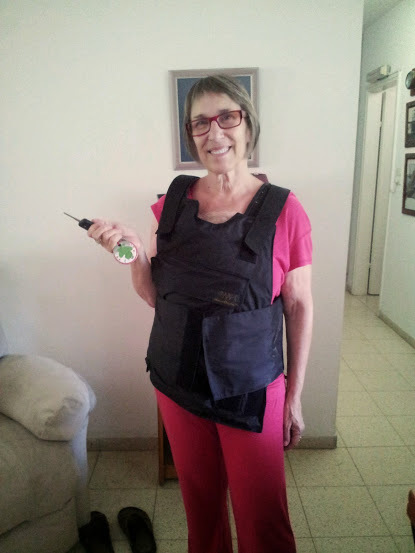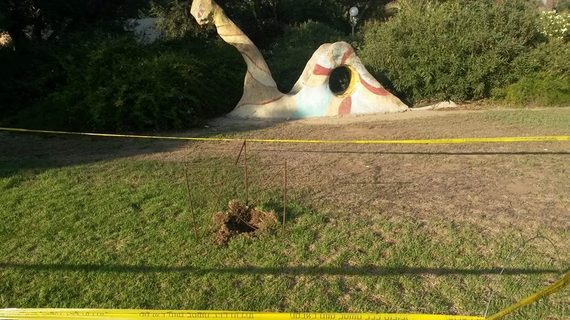On Tuesday morning, my cousin Adele Raemer who lives on Kibbutz Nirim along the Gaza Border, heard the all-too-familiar "Tzeva Adom," red alert, with the usual explosions following ten seconds later. This time, the booms were louder, more violent, as shrapnel from a Hamas mortar pelted her bedroom. The razor-sharp metal pieces, propelled rapidly, pockmarked her walls, generating clouds of dust. Her water heater was hit -- and the kibbutz's electricity soon went out from other rockets in that barrage of seven or eight mortars. Still reeling from weeks of warfare and the death days earlier of a four-year-old child from neighboring Nahal-Oz, she was understandably devastated. Unfortunately, her day got worse.
That night, minutes before the ceasefire, two Nirim stalwarts, Zevik Etzion and Shachar Melamed, who, like her, had stayed on the Kibbutz through fifty days of hellish bombardment (and ten tough years preceding it), were killed, while trying to restore electricity to the community before nightfall after a daylong blackout. A third lost both his legs. The "crime" for which they were punished so severely: living a simple communal farming life, within the "Green Line," Israel's post-1948 borders.
Nirim, established in 1946 in the Western Negev, has blossomed since the 1948 War -- when all the original structures were destroyed as members resisted the Egyptian onslaught. After the war, they reestablished their settlement twenty kilometers northward, by Gaza. Their tough, persistent, visionary pioneering spirit produced a desert Shangri-la, a green island in a sea of brown sand, for 400 people, 180 members, with 100 children.
I have visited Nirim regularly since the late 1970s, when Adele moved there. It's delightful, with that kibbutz quiet, that proletarian simplicity, which even enchants capitalist city-slickers like me. The simple one-story houses, the welcoming communal dining room, all reflect lives filled with values, devoted to one another; focused on maximizing the community's psychic and ideological health not just its wealth.
This is a true farming community. Adele's late husband Laurie Levy, was so proud that their kibbutz maintained a flourishing agricultural branch while most kibbutzim industrialized. Today, Nirim is one of Israel's largest organic farms.
As a leftist HaShomer Hatzair kibbutz, Nirim was one of the last to abandon children's houses and one of the first to seek reconciliation with the Palestinians. Of course, Hamas totalitarians don't distinguish left from right. All Israelis are "occupiers," all Jews deserve death. Israeli leftists complicate Palestinians' simplistic narrative of evil grasping Zionist settlers. These organic farmers, who even under fire continue reaching out to their Gazan neighbors, confuse the world with their remarkable Jewish, Zionist and democratic generosity.
Tragically, Nirim is now famous as a perpetual Hamas target rather than an expression of the Zionist dream. These are the people who would have been swarmed by Hamas's tunnel plan. I am awed by the superhuman grit of my cousin and her neighbors. "This is my home," Adele keeps explaining to reporters, thrilled to have an articulate, English-speaker in the crossfire, "I have nowhere else to go -- I have nowhere else I want to be."
That's what this war was about. As the ceasefires came and went, the children came and went. But Zevik, Nirim's security chief, and Shachar, his deputy, stayed, as did others like my cousin, who refused to please Hamas by fleeing.
They were brave not foolish, superhuman in their determination and idealism but, alas, not invincible. Adele was saved because she was in her safe room when the mortar bombarded her home. A TV crew filming when her two friends were killed showed their rescue interrupted by other "Red Alerts."
With the latest ceasefire, the Kibbutz members have returned home again. They are angry. Hamas always shoots extra barrages just before ceasefires to justify their ridiculous victory claims and parades. Couldn't the IDF have warned Zevik, Shachar and the others to remain inside while Hamas played its deadly game? Couldn't our protectors have suggested that the electricity be fixed the next day? Hamas murdered these two heroes fifteen minutes before the ceasefire. So far, neither the government nor army has apologized for failing these men and their families in a state's basic task -- protecting its citizens.
If in America, conservatives are liberals who have been mugged; in Israel, pro-war pragmatists are leftists who have been bombed. My cousin and her neighbors still mourn Palestinian losses. They still call on "BOTH governments, BOTH peoples" to progress together. But they have lost the radical left's selective perception, which only sees our faults without seeing theirs. "I want to hear those voices from the other side calling, crying, begging for peace and coexistence, just like we are," Adele insists. And she wants the government to work harder to protect her and her community.
Now, the challenge is not just community protection but preservation. In today's mobile world, it's too easy to leave this paradise and shop for another. Whenever I speak to Adele, whenever she describes Nirim's mass post-traumatic-stress, whenever I think about this bruised and bleeding paradise, the heartbreaking Israeli song "Winter 1973" plays in my head, with its haunting refrain: "You promised a dove, an olive branch, you promised peace... spring at home and blossoms." Nirim's people have the spring, the home, the blossoms, even the outstretched olive branch. Hamas stole their peace.
But Nirimnikim built something too special to abandon. At Zevik's funeral, Adele wore a T-Shirt kibbutz members from an earlier ceasefire, "Lo Mevadrim al Nirim," -- WE WON'T GIVE UP ON NIRIM.
They won't -- and neither should we. As long as one Southern community is vulnerable, we all are. The government must lead and protect. Meanwhile, peace-loving democrats worldwide should contribute money, political muscle and expressions of love to these noble everyday heroes defending civilization against today's barbarians.


